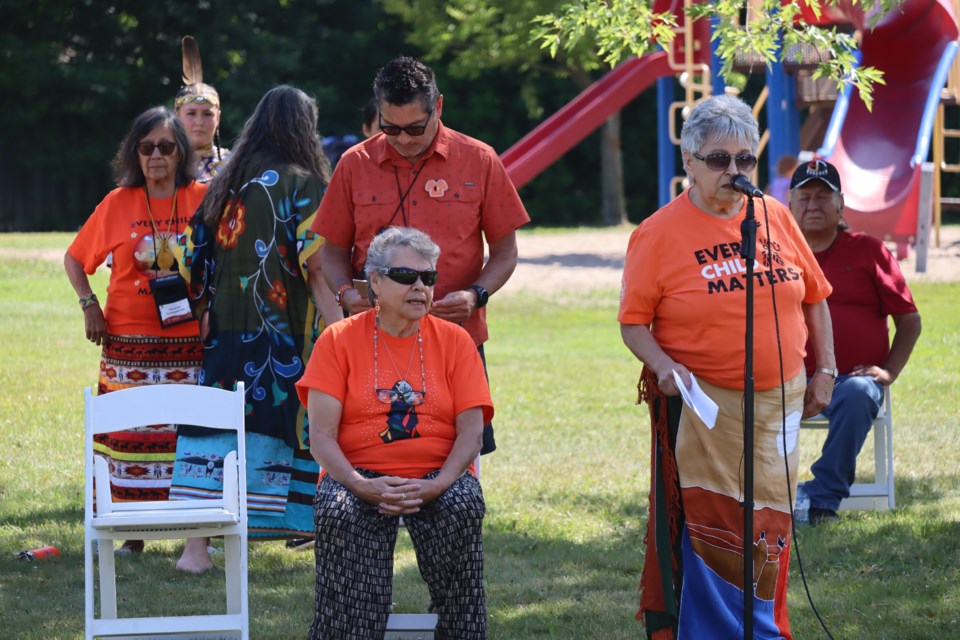Shingwauk survivors in Sault Ste. Marie say it’s time for Canada to consider criminalizing the denial or minimizing of past abuses suffered by those who were separated from their families and communities and placed in residential schools designed to strip Indigenous peoples of their language and culture.
Last week The Canadian Press reported that Canada's justice minister is considering options raised by the independent adviser on unmarked graves, who says Indigenous leaders want Canada to move on criminalizing residential school denialism.
In an interim report released earlier this year, Kimberly Murray called on lawmakers to consider legal mechanisms that could address the practice of denying or downplaying the abuses Indigenous children suffered at residential schools.
“Is it the best thing? I don’t know, I can’t say — but is it going to help the story? Is it going to help us on our journey to true reconciliation? I do believe it might,” said Shirley Horn, who was just seven years old when she was transferred to Shingwauk from St. John’s residential school in Chapleau, Ont. “I’m looking to see further developments on this.”
More than 150,000 First Nations, Métis and Inuit children were placed in the government-funded and church-run residential school system, which was largely overseen by the Catholic Church.
The Truth and Reconciliation Commission of Canada, which spent six years investigating the system, heard from thousands of survivors who experienced physical, emotional, sexual and spiritual abuse, as well as neglect and malnutrition.
An estimated 6,000 Indigenous children died at these institutions, while many experts believe the number to be higher. The National Centre for Truth and Reconciliation has recorded the names of more than 4,000 who died.
Despite the evidence, Murray highlighted in her June report what she says is a concerning rise in denialism tied to what survivors and communities say about children who went missing or died at these institutions and are possibly buried in unmarked graves.
Attention to the deaths and disappearances of these children increased in May 2021, when the Tk’emlúps te Secwépemc Nation announced that ground-penetrating radar had located what are believed to be the unmarked graves of more than 200 children at the site of the former residential school in Kamloops, B.C.
In Sault Ste. Marie, at least 72 children from across Canada were buried in the Shingwauk Cemetery, located in a wooded area behind the site of the former residential school, which now serves as the campus for Algoma University.
Months after the discovery in Kamloops, the Children of Shingwauk Alumni Association (CSAA) — a grassroots, survivor-led group which Horn helped found — led its own search of the former Shingwauk site with the help of ground-penetrating radar. The search has since been put on hold while the group engages with the 85 communities across Canada where children were taken from and placed in Shingwauk, which operated in Sault Ste. Marie from 1874 to 1970.
But ongoing efforts to locate unmarked graves at former residential school sites across Canada have only led to a spike in residential school denialism, especially in extreme right-wing circles.
Horn says there are “mountains of evidence” of the abuses endured at Shingwauk, including extensive residential school archives at Algoma University that CSAA worked to establish there.
“You were told that your families and your way of life was evil,” said Horn. “When you’re little small children, that is very, very harsh.”
And the fight for evidence still goes on today. As previously reported by SooToday, CSAA was denied access to federal records that could potentially help the group identify four children who died at Shingwauk and Wawanosh schools more than 100 years ago.
Earlier this year, Canada announced the formation of the Residential School Documents Advisory Committee in order to provide recommendations for sharing relevant documents of historical interest. Horn was one of six people across Canada selected to sit on the committee.
It’s important for Indigenous Peoples across Canada to have access to those records, Horn said, “so we can know what happened to our people.”
“This group has been organized by the federal government because I do believe that they realize that this is beyond their control — they no longer can hide any of the records that are out there,” Horn said.
Horn and all 10 of her siblings attended residential school. One of her sisters, Jackie Fletcher, can only speculate as to why residential school denialism continues to exist despite all of the evidence out there.
“Their faith may have been crushed that their belief system could do such a thing,” Fletcher said. “They do not have our experience, so how can they deny what we went through?
“The people who are in denial may have been abused in other ways, and no one is paying attention to them. Denial also comes from jealousy, fear, shame and other feelings.”
Fletcher says people pushing back against what happened in the residential school system “need to deal with that in their own way.”
“Our history was never taught in schools, so of course there will be denial,” she said.
Horn believes the denial is fuelled by ignorance, racism and a “superiority complex” — all of which, she adds, “serve as a roadblock to reconciliation.”
Now in her 83rd year, Horn says that criminalizing residential school denialism may be the next step in moving forward.
“You can’t have reconciliation without truth, so as long as they continue to deny, they are holding up the process of truth and reconciliation,” she said. “This has become a challenge for the people who want to move on.
“We want peace in our lifetimes. We want acknowledgement, and we want to be able to honour our own. We are taking the biggest steps toward reconciliation, and I really, really feel in my heart that we have done so much, and we have still got a lot to do — but we’re prepared to do that.”
- with files from The Canadian Press
